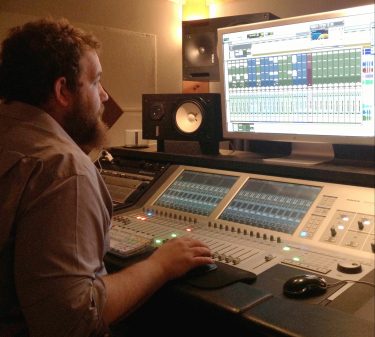
Recording Connection mentor John Terrell
* * * * *
ON HOW HE GOT HIS START IN THE MUSIC BUSINESS:
“When I was 14 or 15, I started playing guitar and writing songs, and then…got a little tape recorder that everybody gets at some point. Started doing that, started recording, and then I got a little drum machine, and then I started recording vocals, realized how bad of a singer I was. But I loved the process of recording, and putting together tracks, and ended up getting a copy of Fruity Loops and figured out how to make beats and compressions and stuff. So I would sell that to the kids in my high school who were rappers, and found out…I wasn’t charging any serious money at all, but I was able to make more money than I would at McDonald’s…And so that’s where I locked into the production side of things.”
ON WHY HE ENJOYS TEACHING APPRENTICES:
“Both of my parents were educators, although I would never teach in a traditional school setting, I definitely have that skill set of both being able to educate, and also understanding whoever’s coming in, like where they’re coming from, and how I can shift my teaching or mentoring style with them so they can understand the material, or whatever needs to happen.”
HIS TAKE ON THE BENEFITS OF LEARNING AS AN APPRENTICE ON THE JOB:
“I had dyslexia, and I struggled through school until I had a music teacher who put a little more energy behind me, and music became my obsession…so I think, even on a grade school level, traditional school isn’t really for everybody. There’s so many different ways to learn, and it’s about finding stuff you’re passionate about…The two people I’m mentoring now, one is a military veteran who has so little technology experience, so a lot of our lesson is just getting comfortable with computers, and then implementing the lessons. Another student I have is super great with computers, and just seeing…I’m sharing more of the music side of it with him…That’s the beauty of this program, is you don’t have to go in with some base level, ‘Okay, you have to have these credentials. Now you can go.’…I think it’s about finding your pocket, and the beautiful thing about this industry is there’s so many different things you can go into…It doesn’t matter how you learn or what you have difficulties with, you can find something for you, and that’s the beauty of this industry.”
ON WHAT HE IS LOOKING FOR IN AN APPRENTICE:
“Someone who’s really engaged, and they don’t necessarily have to be the best by any means, but just ready to work. A lot of it’s just working harder than anybody else. Being very respectful in sessions and with other people, a lot of…I get a lot of kids from the local colleges that come in, and as soon as they start talking to me, their phone comes out…I know that’s not a person engaged. So someone who’s able to be in the moment, focused, and willing to learn.”
BRAGGING ON ONE OF HIS STUDENTS, BRIAN POWERS:
“He’s kind of like a Swiss Army Knife. He plays a little bit of everything…From day one, he was all in. He’s one of these guys who’s always prepared, always knows what’s going on, but in a super respectful way, assistant-wise…if we’re in session or whatever, he writes down all of his questions, [and] we’ll get to tackle them all later…He’s just super bright.”
HIS ADVICE ON PROPER ETIQUETTE IN THE STUDIO:
“When people are in the studio creating, it’s a very sensitive environment. So you have to figure out the level of humor in the room…There’s some clients you can make an offhand joke and it’s fine [but for] some people, it throws off the game. And so you have to figure out the relationship in the room, who’s leading the session, and then understand the pecking order. You’re the assistant, and so if you have something that you want to suggest, like, telling people, ‘Hey, this would work well.’ If you go to the artist and say that, now you’ve bypassed the producer, engineer, and the other members of the band, when really you’re just there to take notes and move a mic. So understanding the order in which things need to happen, and how to creatively suggest things…Also, making sure the needs of the room are met. So if somebody looks a little uncomfortable, just sort that out. But yeah, etiquette is everything in the room…So much of this business comes down to, ‘I don’t like that guy.’ So you just need to be the person everybody wants to be around and be honest and genuine.”
ON HOW TO MAKE THE MOST OF AN APPRENTICESHIP:
“Have a focus. So if you’re someone who wants to engineer hip-hop or someone who wants to mix rock records, know that’s your end goal, but be open to whatever the mentor has in front of you, because you never know when whatever knowledge is going to come into use in your career. And just be open. Be open to anything, because you never know what’s going to come through the door. Yeah, I mean, just be open minded…I think everybody in here should have a little home studio…like Brian has been kind of recording covers on his own, and so he’ll bring in what he’s working on…that’s the other thing. You know, you can be educated and have the book all day, but unless you’re doing things actively, and that’s half the battle anyway. Get as much as you can. Get your hands on any project you can.”
* * * * *
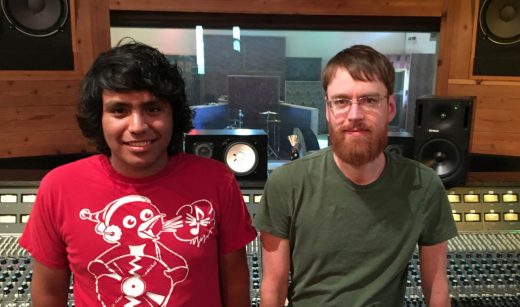
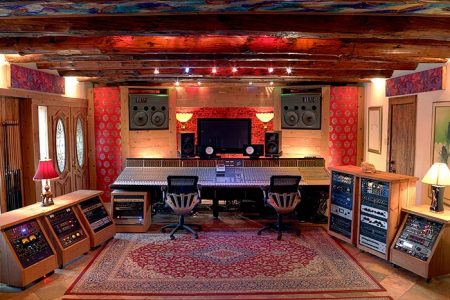
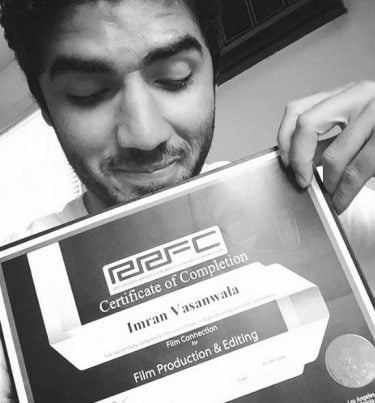 Recent Film Connection grad Imran Vasanwala (Stamford, CT) recently had some great screenwriting advice:
“Momentum is the key. Keeping those energy levels high, keeping a steady pace, continuing the writing process without any stops…keep going, build those characters, make them suffer, give them rewards, give them life. Do whatever you want with it, but keep the story interesting…”
Recent Film Connection grad Imran Vasanwala (Stamford, CT) recently had some great screenwriting advice:
“Momentum is the key. Keeping those energy levels high, keeping a steady pace, continuing the writing process without any stops…keep going, build those characters, make them suffer, give them rewards, give them life. Do whatever you want with it, but keep the story interesting…”
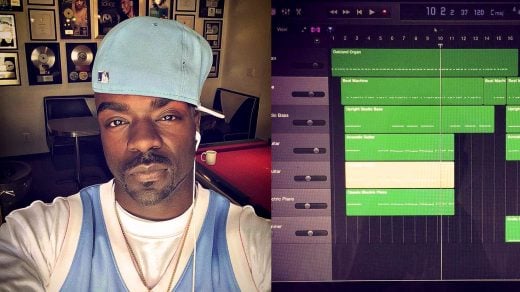 Recording Connection grad Tyron Brickhouse (aka Teflon Treys), who just completed his apprenticeship at Engine Room Audio (New York, NY), recently shared a few words about his experiences in the program: “I am so grateful that it humbled me because I understand the value of the situation that I’m currently in. In the beginning, I didn’t think I would feel this way in the end. Celebrities such as: Fat Joe, Remy Ma, Charlamagne Tha God (Brilliant Idiots), Angela Yee (Li Service)…Kelly Rowland, a few Broadway recording artists…Finally making my own beats. And my engineering skills have matured thanks to the info given through my e-book and the lessons I’m learning at the studio. My mentor has shown me everything I wanted to know and need/needed to know. I’m very grateful for the experience given by The Recording Connection. Everything has worked out better than I thought it would and now I feel confident and eager to go out into the world as an audio engineer, songwriter and beat maker.”
Recording Connection grad Tyron Brickhouse (aka Teflon Treys), who just completed his apprenticeship at Engine Room Audio (New York, NY), recently shared a few words about his experiences in the program: “I am so grateful that it humbled me because I understand the value of the situation that I’m currently in. In the beginning, I didn’t think I would feel this way in the end. Celebrities such as: Fat Joe, Remy Ma, Charlamagne Tha God (Brilliant Idiots), Angela Yee (Li Service)…Kelly Rowland, a few Broadway recording artists…Finally making my own beats. And my engineering skills have matured thanks to the info given through my e-book and the lessons I’m learning at the studio. My mentor has shown me everything I wanted to know and need/needed to know. I’m very grateful for the experience given by The Recording Connection. Everything has worked out better than I thought it would and now I feel confident and eager to go out into the world as an audio engineer, songwriter and beat maker.”




